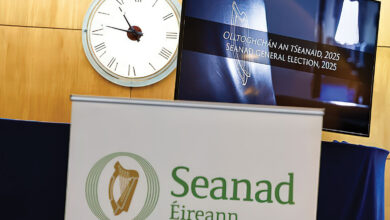Into the nexus
 Scrutiny of the financial crisis will intensify in coming months as the Banking Inquiry explores the full picture. of that period.
Scrutiny of the financial crisis will intensify in coming months as the Banking Inquiry explores the full picture. of that period.
The Oireachtas Banking Inquiry has moved into its ‘nexus’ phase after considering the background to the crash. The term refers to the relationship between banking systems and practices, regulatory and supervisory systems and practices, and crisis management systems and policy responses during that time.
Inquiry Chairman Ciarán Lynch commented that the “cold shadow” of the crisis “can still be seen and felt in every corner of Ireland” but the events leading up to, during and after the crisis remain unclear. His main message to the public was that they would have the opportunity “to hear, at first hand, from those who were involved in one of the major events in the history of our country”.
Jean-Claude Trichet’s appearance before members of the committee (but not the inquiry per se) was a high profile example of that. The meeting was also a compromise as the European Central Bank considers itself solely accountable to the European Parliament and the event took place on his terms.
The IMF’s “broad consensus” was against burden-sharing and Trichet said that it would have been unwise to ‘burn the bondholders’ when Ireland was still seeking to regain the market’s trust.
The exchange also provided a rare direct encounter between the hard left and the ECB. Socialist Party TD Joe Higgins asked Trichet how he could justify taking €65 billion of taxpayers’ money to pay for the “failed gambles of capitalist bankers”. Trichet acknowledged that it was a “very good question” but added that the alternative would have been another Depression.
In other recent evidence, former AIB Chief Executive Eugene Sheehy apologised for a “massive intellectual failure” on the part of his bank: “This failure led to the triumph of models, consensus and market pressure over experience and common sense.”
The failure of Ulster Bank and Bank of Ireland to pass on interest rate reductions to mortgage holders, however, has led to cynical reaction among the public and political representatives. Enda Kenny remarked: “From any moral point of view, from any ethical point of view, when banks are now restructured and on their way to making profit again, it is just not acceptable that when they themselves can borrow at much cheaper rates that they continue to have higher rates applied to mortgage holders.”
Public hearings are expected to continue in mid-September. Under the witness management protocol, there will be a ‘structured witness engagement’ with a seven-week lead-in time between the notification and the public hearing.
A final report must be published by 30 November this year. The inquiry has sought and received nearly 40,000 documents to date – the first time that all key documents over this period have been collated and examined in one place at one time.
Lynch has thanked the secretariat and investigators for their quiet work on behalf of the inquiry and added: “Only by having a complete picture of what happened can we learn lessons and apply these lessons into the future.
“Only then we can truly move on as a nation, when confident that a crisis like this will never be revisited upon us all again.”





